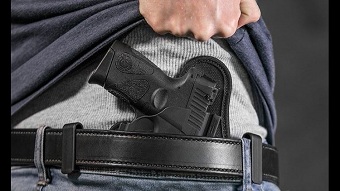Ohioans would no longer need a license to carry a concealed firearm, and teachers would need less training to carry a gun in the classroom, under two bills passed by the Ohio House. The bills — House Bills 227 and 99 — mark the latest attempts by the Republican-dominated Ohio General Assembly to roll back Ohio’s gun-control laws. Both measures now head to the Ohio Senate.
HB 227, which passed the House 60-32, would allow anyone age 21 or older to carry a concealed firearm unless state or federal law prohibits them from possessing a gun. Ohio would become the 22nd state to allow conceal-carry in public without needing a license, according to the Giffords Law Center to Prevent Gun Violence. The bill would also no longer require motorists to tell law enforcement about concealed handguns in their vehicles unless they’re asked.
Right now, drivers who fail to pre-emptively notify an officer in Ohio that they have a gun with them face a first-degree misdemeanor, punishable by up to six months in jail, a $1,000 fine, and suspension of their concealed-handgun license. HB227 would eliminate that penalty.
The bill’s sponsor, Republican state Rep. Tom Brinkman of Cincinnati, noted in a floor speech that he’s been trying for 20 years to get what he called “constitutional carry” passed, and that HB227 is “a huge win for Ohioans and gun owners everywhere.” He added that it would remove a “bureaucratic barrier for law-abiding Ohioans.”
State Rep. Haraz Ghanbari, a Perrysburg Republican, said, “There’s nothing in the constitution that says you can only have the right to bear arms if you take the following training courses.” Ghanbari noted that it’s already legal to carry a firearm openly in Ohio, and he said people walking with a gun outside may decide to put on a coat on if it starts raining. “Now your weapon is covered, and you’re carrying concealed, and now, therefore, you are apparently some type of criminal,” he said.
Ghanbari also predicted that, should HB227 become law, it wouldn’t significantly impact the number of Ohioans getting concealed-firearms training, as they will still want to get a conceal-carry permit that is recognized in other states that require a license to carry a concealed weapon.
A second bill on the House’s agenda, HB99, would drastically reduce the number of training hours needed for school employees to carry guns on school grounds. It passed the House 58-33, with Republican state Rep. Gayle Manning, a North Ridgeville Republican, being the only lawmaker to break an otherwise party-line vote.
Right now, state law only allows educational workers to carry firearms at school if they have completed a basic peace-officer training program consisting of more than 700 hours of training or have at least 20 years of law-enforcement experience.








